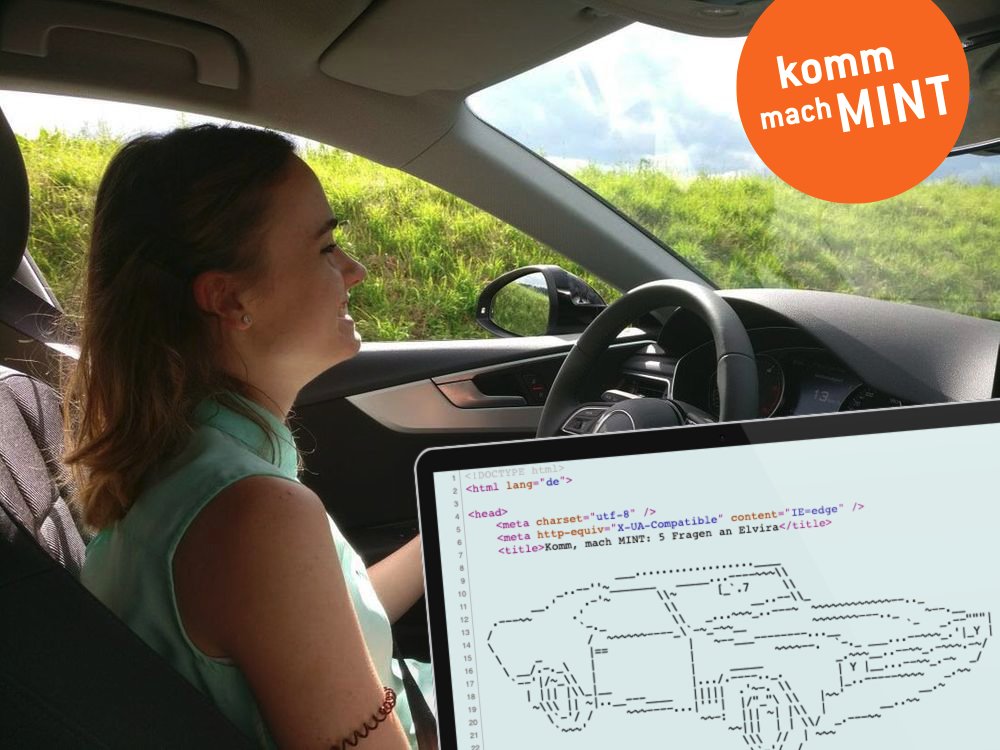
Come do MINT 5 questions for Elvira
Reading time: 3 min
Elvira joined mmmake in 2018 to complete her training as an IT specialist for application development. She was so convincing that we simply had to take her on permanently after her successful training.
But of course it does more than just good programming work. In her free time, for example, she likes to cook and bake. And the fact that she knows exactly how to create a convincing whole from individual components is also evident in her next passion: screwing. Making old cars shine again and cannibalizing one or the other discontinued model for this purpose. Typical woman, right?
If you now want to spontaneously disagree: Maybe, statistically even probably, you are right. But the point is: it doesn’t matter what is typical. We want to encourage people to do what they want. That’s why we’re a member of Komm, mach MINT and why today we’re talking to Elvira about her experiences as a woman in a STEM profession. In the tried-and-tested 5-question format, of course. So, enough self-congratulation, here we go:
Hi Elvira, how and when did you become aware of STEM as a possible career field?
I did an internship at an advertising agency in high school. That’s where I had my first contact with programming and that was already ultra fun for me there. Afterwards, I attended a vocational college for technology and design, where I was able to familiarize myself even more with the subject of computer science.
Were there strong negative or positive reactions to your decision to become a programmer in your environment?
There were practically only positive reactions from my environment and I was also encouraged in the decision by my family. In school, I didn’t even think about whether this was actually a “man’s job”. But then that changed somewhat. During my training, which I did not start at mmmake, I was often ridiculed or neglected by my colleagues as a woman. So along the lines of, “You can’t let the woman do that.” I then also changed companies at the end of my training – to mmmake – and here it’s not a problem. I’m treated just like everyone else and given the same tasks.
What was the ratio of men to women at the vocational college and during the training?
Yes, in vocational school I was the only woman in the class. Then there are also sayings like “She won’t make it for more than half a year. Of course, that takes its toll on you at first, but I didn’t let it get me down. I figured I’d never see them again anyway and ignored them as best I could. I was still there after half a year and also graduated with a good degree.
What fascinates you about the field you work in?
I think that what fascinates many programmers: There are always new challenges, constant further training is simply part of it and there are also good opportunities for it. I mainly work in frontend development with Angular and Typescript, so it’s also fun that I can directly see the fruits of my labor. And the future security of the profession may not be a source of fascination, but it is of course a great bonus.
Do you think women are being made more difficult to enter STEM professions? And if so, by what means?
Yes, I think so. It is often said that you have to try twice or three times as hard as a man to be respected equally. I have also heard that a few women have decided against working in the field because of this. If there were more highly visible role models for women in STEM fields, the incentive might be greater and they could be followed.
****
We thank Elvira for the time and the interview. Next week we will continue with our series on Komm, mach MINT. So check back here on the blog or follow us on LinkedIn, Xing or Facebook to never miss a post again.